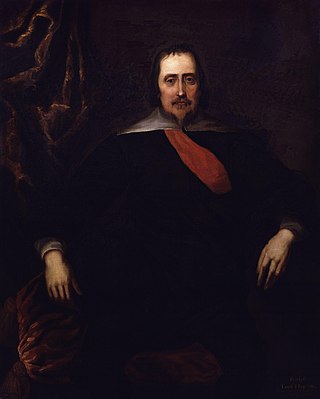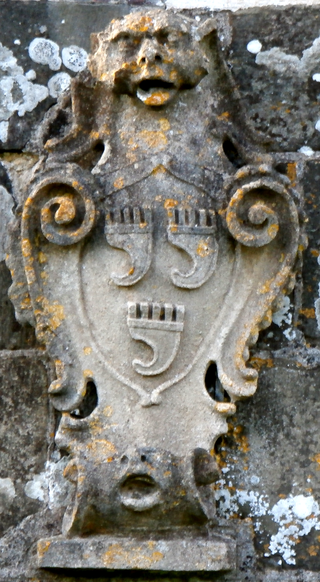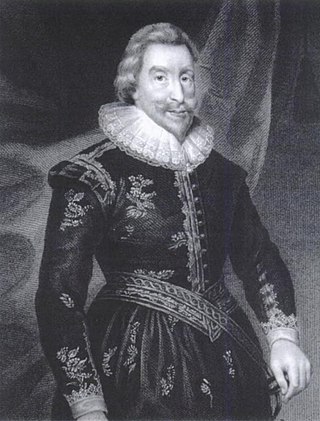
Sir William Davenant, also spelled D'Avenant, was an English poet and playwright. Along with Thomas Killigrew, Davenant was one of the rare figures in English Renaissance theatre whose career spanned both the Caroline and Restoration eras and who was active both before and after the English Civil War and during the Interregnum.

Sir William Waller JP was an English soldier and politician, who commanded Parliamentarian armies during the First English Civil War. Elected MP for Andover to the Long Parliament in 1640, Waller relinquished his military positions under the Self-denying Ordinance in 1645. Although deeply religious and a devout Puritan, he belonged to the moderate Presbyterian faction, who opposed the involvement of the New Model Army in politics post 1646. As a result, he was one of the Eleven Members excluded by the army in July 1647, then again by Pride's Purge in December 1648 for refusing to support the Trial of Charles I, and his subsequent execution in January 1649.

Ralph Hopton, 1st Baron Hopton was an English politician, military officer and peer. During the First English Civil War, he served as Royalist commander in the West Country, and was made Baron Hopton of Stratton in 1643.

Sir Richard Grenville was a professional soldier from Cornwall, who served in the Thirty Years War, and 1638 to 1651 Wars of the Three Kingdoms. He was the younger brother of Sir Bevil Grenville, who died at Lansdowne in 1643, and grandson of Admiral Sir Richard, killed at Flores in 1591.

Sir Francis Windebank was an English politician who was Secretary of State under Charles I.

Edward Montagu, 1st Earl of Sandwich, 27 July 1625 to 28 May 1672, was an English military officer, politician and diplomat from Barnwell, Northamptonshire. During the First English Civil War, he served with the Parliamentarian army, and was a Member of Parliament at various times between 1645 and 1660. Under The Protectorate, he was also a member of the English Council of State and General at sea.

Katherine Howard, Countess of Suffolk was an English court office holder who served as lady-in-waiting to the queen consort of England, Anne of Denmark.

Walter Aston, 1st Lord Aston of Forfar KB was an English courtier and diplomat.

Francis Cottington, 1st Baron Cottington was the English lord treasurer and ambassador and leader of the pro-Spanish, pro-Roman Catholic faction in the court of Charles I.

Virgilio Malvezzi, Marchese (Marquis) di Castel Guelfo was an Italian historian, essayist, soldier and diplomat. Born in Bologna, he became court historian to Philip IV of Spain. His work was hugely influential and was praised by Francisco de Quevedo and Baltasar Gracián among others.
Richard Byfield (1598?–1664) was an English clergyman, Sabbatarian controversialist, member of the Westminster Assembly, and ejected minister.
Robert Hopton (c.1575–1638) was an English landowner and politician who sat in the House of Commons in two parliaments between 1604 and 1622.
Christopher Windebank, was an English translator who lived in Madrid and worked as guide and interpreter for English ambassadors.

Juan Fernández, nicknamed El Labrador, was a Spanish Baroque painter active between 1629 and 1636, specializing in still life painting.
Sir Arthur Hopton KB, of Witham, Somerset, was an English politician. He was member of parliament for Dunwich in 1571, and for Suffolk in 1589. He was made a Knight of the Bath at the coronation of King James I.
Sir Richard Kemp was a planter and politician in the Colony of Virginia. Kemp served as the Colony's Secretary and on the Governor's Council from 1634 to 1649. As the council's senior member, he also served as the acting Colonial Governor of Virginia from 1644 to 1645 during travels by Governor Sir William Berkeley. Kemp had also worked closely relation with Berkeley's predecessor, Sir John Harvey.
The Somerset Trained Bands were a part-time military force in the county of Somerset in South West England from 1558 until they were reconstituted as the Somerset Militia in 1662. They were periodically embodied for home defence, for example in the army mustered at Tilbury during the Armada Campaign of 1588. They fought of the Battle of Newburn in the Second Bishops' War and their units saw considerable active service for both sides during the English Civil War.











